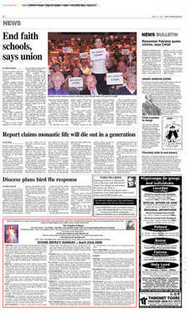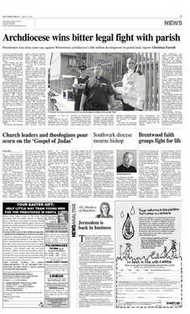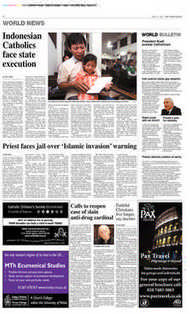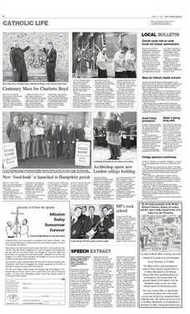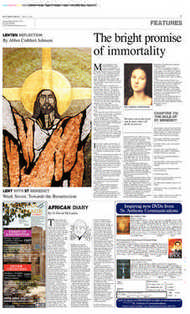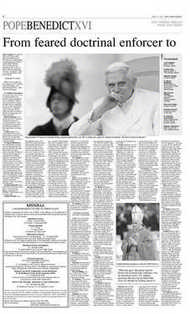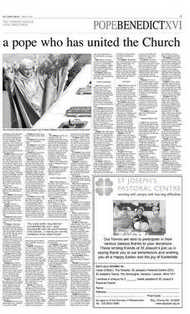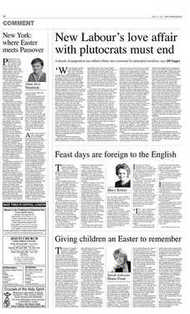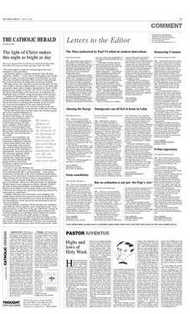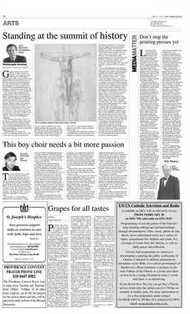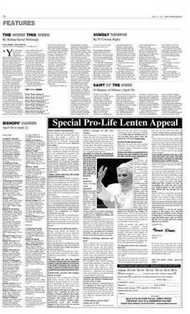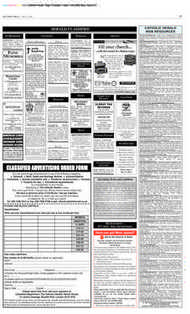Page 8, 14th April 2006
Page 8

Page 9
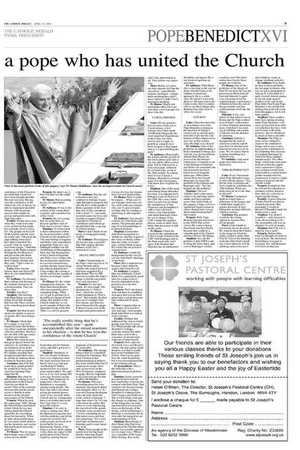
Report an error
Noticed an error on this page?If you've noticed an error in this article please click here to report it.
Tags
Share
Related articles
Cardinals Prepare For Conclave
Pope Calls For Return To The Confessional
• •
Top French Bishop Seeks To Reconcile Lefebvrists
The Red Pope
POPEBENEDICTXVI From feared doctrinal enforcer to a pope who has united the Church
Luke Coppen: It’s April 19, 2005. The white smoke drifts into the Roman air. The thick red curtain flutters on the balcony of St Peter’s. And Cardinal Medina Estevez steps out and announces that we have a Pope. When he announces the name “Josephum” there are gasps and cheers in the square below.
HABEMUS PAPAM!
What was your gut reaction when you saw Cardinal Joseph Ratzinger – now Pope Benedict XVI – walk out on to the loggia?
Fr Anthony Symondson: It was joy in my case. I was so relieved that he was elected, mainly because I’d been reading his work for some years before, largely prompted by the antagonistic view of him in the press, which I knew couldn’t be right. I knew he was the right man. He was certainly not the caricature that was being presented.
Piers Paul Read: I felt exactly the same. I also felt vindicated because I’d recommended him as the next pope in the Spectator. So I felt pleased that the Holy Spirit had seen things my way.
Freddy Gray: I was rather shocked, because I had written an article for the Racing Post saying that Cardinal Rodriguez would be the next pope.
Fr Shaun Middleton: I felt relief that the cardinalelectors had done their job and very quickly. The other thing I felt was slight concern that they’d elected a 78-year-old, and that this might be just a holding operation. One didn’t know what to expect because, whether you love it or hate it, he had done a lot of work on Dominus Iesus, and I think that continued to haunt him. Overall, the feeling was just being open to the will of the Spirit and seeing where his leadership would take us. I thought they might have gone for an Italian, which I would have preferred. (I had my money on Tettamanzi.) Gordana Sherriff: There had been an awful lot of bad press. I was uncertain. Being a relatively new Catholic, I didn’t know what it would mean.
Stephen Hough: I was disappointed at first. We know him really from what other people and the press have said, and of course from his writings as well – but one feels that some of those were written as a Vatican official, rather than as himself. And the things that he wrote as Joseph Ratzinger seem to me more attractive than those that he wrote as the Pope’s defender of the doctrine of the faith. But I think it’s interesting that many people who were not just disappointed but absolutely horrified have changed very quickly. I think that so much of this is about perception. Pope Benedict is being himself, and the media are attracted by that simplicity and goodness, and clarity of thought.
Damian Thompson: I was in the front row in St Peter’s Square. I ruthlessly elbowed aside elderly nuns in order to get there. Actually, one of them helped me over a barrier. When I heard the word “Josephum” I was astonished, because I didn’t actually think it was going to happen. I’d run into Fr Andrew Greeley in St Peter’s Square that morning and he’d said: “It’s going to be Ratzinger. That was a victory speech we heard the other day.” His face was full of anger. And Ratzinger was so intensely loathed and demonised not just by liberals, but by middle-of-theroad Catholics as well, that I thought it inconceivable that the cardinals would make such a decision. The scenes around me were extraordinary. I was next to a crowd of Legionaries of Christ who almost expired from excitement, but a few feet away the Rome correspondent of a Catholic magazine apparently burst into tears... And not tears of joy, I can assure you. Since when, I’ve come to read a number of books by the then-Cardinal Ratzinger. I’ve been enormously impressed by the clarity and elegance of thinking, the importance he attaches to the aesthetic of worship, and I’ve generally found him an enormously more accessible author than his predecessor.
Fr Anthony: It’s important to draw a distinction between his own work and those documents that emanated from his department, because they were corporate documents to which many people contributed. They are official documents of the Church.
Piers: A lot of people say: “Oh well, he only made those statements because he had to, as prefect of the Congregation for the Doctrine of the Faith.” But something like The Ratzinger Report contained some of the most provocative and what some people would regard as the most illiberal things he has said. And these were said voluntarily by him in that context.
Fr Anthony: But nevertheless it was an independent interview rather than an official pronouncement.
HUMBLE WORKER IN GOD’S VINEYARD Luke: In his first papal blessing, Pope Benedict described himself as a “humble worker in God’s vineyard”. From the start, he has tried to deflect people’s attention away from the Pope and towards Christ. He has dropped some of the few remaining “triumphalistic” symbols of the papacy. His coat of arms, for example, omits the papal tiara. The Pope has also renounced the historic title of “Patriarch of the West”. Is this simply modesty and shyness, or is this a radical new way of being Pope?
Fr Shaun: You have to remember that he wasn’t the first pope to dismiss the tiara. John Paul I actually did that.
Damian: But the point is that there is no tiara in his coat of arms, which has absolutely horrified the traditionalists.
Francis Phillips: Yes, he’s got a mitre, which means he wants to emphasise being a bishop.
Fr Anthony: The tiara is associated with being a monarch in a secular sense with papal states. In a way, the tiara had become redundant because he wasn’t a sovereign pontiff as they used to be.
Stephen: We can say: “Well, it doesn’t really matter to the faith. What really matters is the Creed, and so on.” But to people outside – and I’m talking about the grandchildren of those radicals by whom he was affected in 1968 – these things are so irrelevant. Not even in a religious sense, but even in a secular sense, because there are no monarchies left in that part of the world. So these small points of style matter more than we think. There are two things that come to mind. One is St Francis, who said: “Preach the Gospel always, and occasionally use words.” And the other one is, I remember about reading a monastery in France where it was a gatekeeper who made more converts than any of the monks inside. He was an illiterate lay brother who never spoke to anyone, but it was the kindness which he welcomed people and his holiness...
Fr Shaun: But there’s also an acute political sensibility there. I’m thinking particularly of the appointment of the new cardinal in Hong Kong. The Russian bear has been defeated, so Asia is a priority. Another is the Middle East, where we have seen a distancing from the whole Palestinian question with the appointment of a bishop to the Hebrews. So he’s not just a holy man. There’s also an acute political operator in Benedict.
Piers: He’s obviously decided not to imitate or compete with his predecessor. I think he must have had plenty of time to think about how he would behave as pope. The lucidity of his thinking is being expressed in what he’s doing. I’ve always thought that he sees very, very clearly what the really important issues are. I suppose some of us thought he would do less subtle and more dramatic things. He seems to be moving quite cautiously.
Luke: So Pope Benedict is the pontiff of the small gesture, where John Paul II was the pontiff of the grand gesture...
Freddy: It could be said that he hasn’t actually done anything yet. So we are reading a lot into very small gestures. Because he’s a new pontiff, and everyone’s excited and people want to unite behind him, I think they are reading too much into what are not terribly significant acts.
Francis: But a year is quite a long time in the life of a papacy.
Fr Shaun: People are comparing this with the beginning of the Roncalli administration, the famous first 100 days, where a lot of stuff happened. They’ve been disappointed that there’s been slow movement in comparison to that.
Gordana: But is that not because we had become used to John Paul II, with his huge initiatives that affected an awful lot of people across the world?
Francis: Perhaps not a lot has happened on the surface, but underneath a lot has happened. The Pope was, as a theologian, a rather shy and self-effacing person. When you become pope, obviously you grow into the office in some way, and of course the Holy Spirit is with him, and he can’t just be any longer a shy German theologian. But nonetheless he’ll bring that personal style to the office and that will somehow colour the office, just as with John Paul II. Benedict is bringing his own rather quieter genius to the role. He has said he isn’t going to produce many encyclicals. There are still a whole lot of them waiting to be processed. He’s not going to go on any world tours, because I understand there’s a deficit in Vatican finances. But he is going to sort out the Church, perhaps via the Curia, attend to the home front.
Damian: Lots of traditionalists are positively disappointed by the slowness with which the Pope has moved. They had a fairly clear idea of what Ratzinger’s agenda would be. It was, to use his own words, a “purification” of the Church, which would involve a fairly radical reform of the Curia, which, after all, he had observed closely for over 20 years. It involved improvements in the standards of liturgy. So far there have only been small moves in that direction, and I’m wondering whether it’s because, as everyone says, the sensible parish priest waits for a year before he does anything, or whether expectations were simply too high and people misunderstood him.
Fr Anthony: I realise that a year is probably a long time in papal terms, but it’s a very short time generally. One of the problems of the modern world is that people have always got to make larger-than-life gestures to justify their existence – which is absolute nonsense. Jesus began his public ministry with a long retreat before he did anything. He was tempted to do all sorts of stunts, but he resisted them. I’m sure that Ratzinger knows exactly what traditionalists were expecting of him. The last thing he’d do is do what they wanted, because there are other considerations... It’s all to do with an oldfashioned virtue called prudence. He’s a very prudent man. Imagine if in the first month he’d granted a universal indult to the Tridentine Rite when hardly any priests on earth know how to celebrate it – beyond, at most, 500. It would have been irrelevant. The same applies to all the other rather pernickety things that the traditionalists wanted. It’s quite possible that there are going to be ameliorations and permissions for certain rites in time, but I suspect that this year’s interval is quite deliberate, because he doesn’t want to go making expansive gestures like his predecessor. We all know interiorly where Pope Benedict stands through his work and what he’s done before, and I suspect that change will happen in as pacific a manner as possible, because I think he’s got a strong pastoral sense as well.
Piers: Sometimes what seems to be a small and not easily understood gesture can be the tilt of the rudder of the supertanker. For example, what he’s done by moving Archbishop Fitzgerald from the Vatican. It’s difficult for us outside to know quite what it means, but you feel it may indicate a change in attitude towards Islam.
Fr Shaun: I think that, again, that demonstrates his political capabilities. If western societies are according such great freedoms to Muslims to come and live here and worship freely, surely the same rights ought to be granted to Christian people living in Muslim societies. That’s what all that’s about.
Stephen: But we don’t have to go back that far in history to when Christendom would not permit that to others. So the Muslims could say: “Well, look just 200 years ago if you were living in Spain you had no rights if you were not a Catholic.” But the question, when we talk about making gestures, is: what should a Pope be doing? If a Pope should be a shepherd and preserving the faith, you could argue that there is nothing to do. Why would you need lots of new documents coming out if the faith is already there? One of the most interesting things that Benedict said a few years ago is that we shouldn’t require Orthodox Christians to believe anything beyond the first millennium of the Magisterium. If that’s true for them, is it true for Catholics too? If that’s the case, then how do you weigh up the balance between papal power and pastoral care?
Fr Anthony: But the really terrific thing that he’s accomplished this year – quite unexpectedly after the mixed reactions to his election around this table and throughout the Church – is that he has won the confidence of the Church to an extent that would not have been thought possible this time last year. Having won the confidence of the Church he will, in theory, be able to implement desirable reforms with far greater success than simply by giving mad permissions left, right and centre.
Freddy: People have read what they want to see into every gesture he has made. For example, Deus Caritas Est. The people on the Left of the Church and the secular world said: “Oh great, the pope talking about love! Isn’t that wonderful? It’s exactly what we want to hear from a pope.” And then people on the Right scanned through the bit about love and got to the part about how charities must retain their Catholic identity and they said: “That’s what we want to hear.” Luke: Does anyone believe there has been a PR drive to win round liberal opinion?
Fr Anthony: No, because that’s falling into the trap of the modern mechanics of communication. They are above that.
Freddy: Are they?
Stephen: The meeting with Hans Küng was interesting. Everyone thought that was fair. There seemed to be something good about that.
Francis: But that demonstrates his charity as universal pastor. He’s now Küng’s pope.
Fr Shaun: I think that he’s simply a very wellmannered man. His brother says there’s just one problem with him and that’s that he’s too old. But with age comes wisdom and maturity.
Piers: But when he gave that great speech before the conclave, he said there was an enormous crisis in the encounter with secularism. It’s slightly puzzling that, having declared that crisis, he should do nothing about it when he becomes pope.
Gordana: But if he had made these grand gestures he would have been criticised for imitating Pope John Paul II.
Damian: But when he talks about wishing to see a purification of the Church what do you think he means? One of the contrasts between him and his predecessor is that he is more focused on the internal governance of the Church.
Francis: When he used the expression “filth” during the Good Friday meditation I didn’t think he was just talking about the Church generally; he was talking about the hierarchy. When he talks about purification, he is to some extent addressing the hierarchy and saying that purification must take place there.
Fr Shaun: Was he saying that bishops were a bit lukewarm, do you think? Francis: He didn’t say it, but I felt that was the implication.
Fr Shaun: But according to you, he called them “filth”...
Fr Anthony: It was in the context of the recent abuse scandals, and a justified use of the word.
Francis: He was saying that we really have to become apostles, men of God, and we haven’t been.
Damian: To what extent is there enthusiasm within the local hierarchies of the Church for this pontificate? The only bishop in England and Wales who immediately praised the Pope in a very forthright manner was the Archbishop of Birmingham. How does the bureaucracy of the Church in England and Wales view a Pope who has declared his opposition to excessive bureaucracy and has already begun merging Vatican departments? Conceivably, the writing is on the wall for the legions of advisers to bishops’ conferences.
Fr Shaun: It’s the whole management structure – the third-class David Brents who run around the place managing things. What we’ve got to get back to is the biblical concept of leadership, that leaders in the Church stand out. A very good example of that is the opposition to the Joffe Bill. There is a call for genuine leadership and less bureaucracy, and that’s got to be a good thing.
Stephen: Simplicity of life, too. People in Boston were very impressed when this huge mansion that was barely used was sold and Archbishop O’Malley decided to live in a much more modest place. We can’t live as if we were living 500 years ago, because secular society finds simplicity so impressive. That’s why Buddhism is so popular among young people. The New Age talks a lot about giving up material possessions. If we can look at the Church and see it happening there even better than in the New Age then it’s a very powerful witness.
Damian: I’m sorry to sound a carping note. But the Bishop of Lancaster also sold his residence and all the money he saved by that noble gesture has been swallowed up by his own bureaucrats. Surely, if the Pope is serious about cutting waste, then one aspect of the purification of the Church might be sacking bureau crats.
Fr Anthony: But the call to holiness isn’t just confined to bishops. It goes right through to religious life into the lives of the people. I think especially in the west that ease of life, corruption with a small “c”, can easily encroach upon our lives and insulate us against Gospel imperatives. Periods of worldliness and reform go up and down like a zig-zag in Church history.
Piers: I don’t think of our clergy as being particularly worldly.
Fr Anthony: But religious life has become a comfortable little setting. But this softness of life isn’t immoral, it’s cosy.
DEUS CARITAS EST Luke: Commenting on the Pope’s first encyclical, Fr Aidan Nichols asked whether the subject [of love] had been suggested by a spin-doctor. Was it a PR exercise to soften the Pope’s image or did the encyclical have real substance?
Francis: It’s not just gentle. It’s also tough. The opening line is “God is love”, which the secular world interprets as “God is lurve”. But actually, he then goes on to examine what love means, and that eros has to be purified by agape. It doesn’t come over in the complicated philosophical language of his predecessor. It’s accessible.
Fr Anthony: The strange thing is that it’s completely informed by Platonism. But it isn’t locked in that phenomenological philosophy from which John Paul II could never escape. Eros only occurs twice in the New Testament, compared to agape. But it’s important in an eroticised age for him to affect the balance.
Fr Shaun: This says something about his own character, theological ability and chutzpah. Here’s a 78year-old German theologian who can write about the erotic, which is fantastic. I hope that when I’m 78 I can write about the erotic! But when we were introducing the encyclical in the parish, someone came up and said: “At last, something on sex that makes sense and that isn’t punishing.” It’s a very adult take on human relationships and it wasn’t punitive at all.
Piers: Some people in the parish were having heart attacks when they heard from the pulpit that Deus Caritas Est lays the foundations for civil partnerships.
Fr Shaun: Well, it could be argued... When you’ve got a deeply eroticised society, such as the gay community, you’ve got civil partnerships that are coming in and trying to add responsibility.
Fr Anthony: You mustn’t confuse sex with bricks and mortar. The principal advantage of civil partnerships is to protect property.
Stephen: I remember John Paul saying that we should see chastity as part of the virtue of charity rather than the virtue of temperance, which I think is possibly where this encyclical is coming from.
Fr Anthony: I think the background for the encyclical was John Paul’s theology of the body.
Piers: But it surprised me because I don’t think he quotes John Paul II at all.
Fr Anthony: I suspect that was deliberate. I don’t think it is a particularly good idea for a pope to be so heavily dependent on his predecessor in his first encyclical.
Francis: Well, not dependent, but there is a tradition of respect that you do build upon what your predecessor had written and to quote him.
Piers: I suppose that on the subject of sexual love and marriage, some people think John Paul was radical in the extreme.
Freddy: Perhaps that influenced the way in which people read Deus Caritas Est. When people talk about Benedict’s writings, certainly around this table, there does seem to be a conscious or unconscious criticism of John Paul II.
Francis: Well, after his first book, Love and Responsibility, the joke going round Krakow was that it would have to be translated into Polish. That was his problem. He wrote beautifully but it was incomprehensible to the ordinary person.
Fr Symondson: That is the difficulty with a phenomenological philosophy.
Damian: Some conservative priests have told me how much they welcome the contrast with John Paul. That surprises me because I imagined that people wanted Benedict to continue John Paul’s legacy and build on it. But several clergy welcome the change in emphasis. One of the things they are looking forward to is a renewed focus on the beauty of the liturgy, which in Ratzinger’s theology is not beauty for its own sake but integral to our understanding of God.
Stephen: Interestingly, I don’t think John Paul ever celebrated the Old Rite Mass and he was actually opposed to it in many ways. When I was a member of the Latin Mass Society, they really didn’t like John Paul II at all. They felt he was repressive.
Piers: Before we move on, does anyone feel that the encyclical – undoubtedly elegant, intelligent – taught them anything they didn’t know before? I didn’t feel I had learnt anything.
Fr Shaun: Maybe not around this table, but I am sure there a lot of people out there who did.
CURIAL REFORM Luke: We are going to have to move from sex to Curial reform. A few changes have been made. Archbishop Fitzgerald, the most important Englishman in the Curia, has been moved and a couple of pontifical councils have been merged. Is that important or is it just shuffling the pack?
Fr Anthony: Historically, the reform and the growth of the Curia almost goes like a zig-zag. Quite often a curial pope will be followed by a non-curial pope, followed by a Curial pope. Look at the 20th century. In a funny kind of way it keeps a balance. Benedict is a Curial pope. It is the curial popes who know how to prune the Curia.
Stephen: One of the most astonishing things Benedict has done is to appoint Archbishop Levada as Prefect of the CDF. He is not a hardliner. Levada was in charge the Archdiocese of San Francisco and he handled it with a very soft touch, which is not what people said about Ratzinger when he was in charge of the CDF. I think that signifies that he wants to show flexibility, that discussion is still on the cards.
Fr Shaun: I think the reason for the appointment is that Levada worked at the CDF with Ratzinger and so the Pope trusts him, but I agree with Stephen that Benedict has an intellectual flexibility and rigour. He is not afraid of opening up questions.
Fr Anthony: What Benedict is showing in the way he deals with the Curia is his subtlety of mind and approach. He is a subtle man. He doesn’t want to be abrasive. He knows how the Curia works. But it is rather silly to say these things after Benedict has only been in office for a year.
LITURGY Luke: There has been lots of speculation over what Pope Benedict is doing on the question of liturgy. I want to ask a concrete question first of all: has the celebration of Mass improved in any way in this country since the Pope was elected?
Fr Anthony: One of the problems of implementing a better standard of liturgy lies with the way the recommendations from Rome are received by the bishops’ conferences. Certainly as far as the Bishops of England and Wales are concerned, the last document has been toned down to keep the status quo. When Dom Alcuin Reid met Joseph Ratzinger, he raised the problem of the bishops and Ratzinger said: “Yes, the bishops are the problem.” Damian: The real Achilles’ heel is the music, which is by and large abominable and drives people away. One of the fruits of this papacy, I hope, will be a significant improvement of music, though how you go about implementing that I don’t know.
Francis: Well, Pope Benedict has put out feelers to the SSPX [the Lefebvrists]. He wants to bring them back into the Church because they could be a valuable part of the Church and they do love the liturgy.
Stephen: Yes, but the problem is that SSPX want to bring the Index back, and a lot of Ratzinger’s books would be on it! We don’t realise how hostile these people are to Rome.
Fr Shaun: One of the problems of the liturgy of Paul VI has been the way the priest has to thrust himself forward. Benedict’s quiet way, not going in for the superstar pope, could mark a withdrawal from the cult of the personality and that could translate itself into the liturgy.
Damian: I was very struck by that when I was in Rome and the Pope walked in to St Paul’s with leaders of other Christian denominations. I felt that I was looking at a bishop, not a pope, so intense was his absence of charisma.
Gordana: Initially I thought that the lack of charisma could be a problem, but over the last year that has become less of an issue. We all realise that he is doing something in a different way.
Fr Anthony: And some popes have been dull as ditchwater.
TIME RUNNING OUT Luke: Every discussion about Pope Benedict seems to end with the phrase, “Yes, but his time is running out.” Next month he celebrates his 79th birthday. What one thing must he do in the time he has left?
Fr Shaun: I genuinely think he might make a difference to the liturgy, and I think there might be a greater diversity of rites taking into account different cultural contexts.
Gordana: Big gestures would be the wrong approach, because they divide people.
Piers: I don’t think he necessarily has to do much. He wants to keep the Church in the image in which he really created it under John Paul II. A lot of his thinking went into John Paul’s teaching. I don’t think he will do anything radical because I don’t think he wants to change anything radically.
Fr Anthony: I am thankful that we have probably the last pope in history who was an active participant in Vatican II. I also think it is quite wicked, almost satanic, to set one pope against another: to try and divide Pope John Paul II and Pope Benedict. I am certain that nothing but good will come from this papacy, but it will done quietly.
Stephen: There could a little more spring cleaning under Pope Benedict: a bit more giving back icons that we took from the East. A lot can be done with small gestures, and we should do as much of that as possible.
Damian: The Pope is more or less obliged to improve the standard of liturgy and to ease restrictions on the celebration of the Tridentine Rite because as Cardinal Ratzinger he called for those changes unequivocally. The other thing, which may seem paradoxical, is that this apparently conservative figure may well present the traditional faith in a rather kinder, gentler manner than his predecessor. I expect a slight easing of tension with the outside world.
Francis: It might be that he will turn his attention to seminary reform, because that, after all, is the key to improving the liturgy.
Freddy: A great criticism of John Paul II was that he churned out saints. But, personally I would be pleased if Benedict made his predecessor a saint.
Stephen: I’m afraid I wouldn’t – only because it is the obvious thing to do. The personality cult was an obstacle for a lot of people.
Damian: But if he was a saint, he was a saint!
Francis: Before John Paul, we thought of saints as way up there. He showed us that holiness was part of everyday life. And Benedict will show us that, too.
blog comments powered by Disqus



